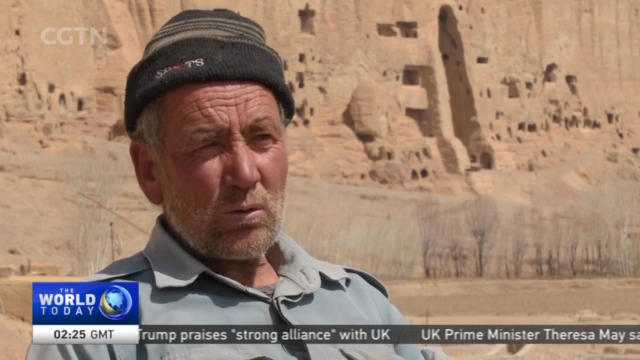
11:14, 05-Jun-2019
Through Their Eyes: Afghanistan man who helped destroy Bamyan Buddhas speaks out
Updated
09:21, 06-Jun-2019
05:16

Afghanistan's Taliban government ruled the country for over half a decade at the end of the last century. It was a period marked by human rights abuses and merciless assaults on the country's cultural heritage. No attack was more shocking than the destruction of the centuries-old Buddha statues that gazed out over the historic city of Bamyan. With the Taliban now poised to negotiate for a power sharing deal, many fear a return to the past. Including the man who was forced to help destroy those iconic statues. CGTN's Sean Callebs tracked him down in central Afghanistan.
Patience may be a virtue but it's an absolute necessity in Afghanistan. Just ask Sayed Mirza Hussain, a simple bicycle repairman from Bamyan. He'll wrestle much of the afternoon with this wheel, to make about five U.S. dollars. He's always called this central Afghanistan enclave home.
SAYED MIRZA HUSSAIN BAMYAN RESIDENT "The area you see now, was a marketplace before the Bamyan downtown was built - this is where we used to our shopping."
Much of the outside world knows Bamyan, because of an assault on its cultural heritage. The city rests along the old Silk Road -where in the months before the 9/11 terrorist attacks, the Taliban horrified much of the world by destroying two giant Buddhas carved into the mountainside.
SAYED MIRZA HUSSAIN BAMYAN RESIDENT "I always feel sad, disappointed, and uneasy when I drive past this area."
Sad and uneasy for good reason. This soft-spoken Hussain, will forever be known as the man who was forced to blow up the Buddhas. It left a hole in the mountain and an empty spot in Hussain's soul.
SEAN CALLEBS BAMYAN, AFGHANISTAN "This is the spectacular view from buddha mountain. And if we walk down this path, through here is a cave that leads to the top of the Buddha. The door is locked now, for obvious security reasons. But back in 2001, Sayed Mirza was forced with a horrific decision; marched up here at gunpoint by the Taliban to plant explosives in the buddhas. If he didn't do it -the only option was being tossed over the edge to a certain death."
There's a bustling market in the city now. But at the height of the Taliban's power -it was chiefly a ghost town. Ethnic Hazaras like Hussain were imprisoned.
SAYED MIRZA HUSSAIN BAMYAN RESIDENT "The first day I was captured I was beaten so badly I couldn't believe I lived - I lost consciousness for 24 hours."
Calling the buddhas 'idol worship,' the Taliban wanted to send a message of hate to the world. The insurgents lowered Hussain and another man from the top, to drill holes and plant dynamite in the statues. While dangling from here, Hussein says his friend died of a heart attack.
SAYED MIRZA HUSSAIN BAMYAN RESIDENT "I took him to this cave, and put a blanket over him."
But, Hussain lived - to witness this.
SAYED MIRZA HUSSAIN BAMYAN RESIDENT "We felt devasted, and upset. It was a world class unique statue but we destroyed it with our own hands. People came from all over the world to see it -but we destroyed it with our own hands."
What's left of the buddhas are stored in shacks, --but much of it has already been carted off by smugglers. Many in Bamyan -including archeologist Anar Gul Ahmadi, would like to see the statues rebuilt from the rubble.
Sean: "It looks like the world's most complex jigsaw puzzle. Is there anyway it can be rebuilt?"
ANAR GUL AHMADI ARCHEOLOGIST "My concern is that they are stored in a place where people step on them -and they deteriorate, and when we want to work on the buddhas to rebuild they will be in just awful condition."
She knows it will be next to impossible to rebuild the iconic statues. But, Ahmadi sees another threat. The Taliban are involved in Afghan peace negotiations -- while she dearly wants an end to the violence, she is terrified at the prospect of the Taliban having any government authority.
ANAR GUL AHMADI ARCHEOLOGIST "I think it will be really difficult for women. They won't allow women to work with the tourists on these historical sites - I fear women will once again be underprivileged."
The mountains are now a protected UNESCO site- recognizing the historical Buddhist sanctuary where East meets West along the Silk Road.
Within the caves that dot the mountain - brightly painted icons still peek through the years of abuse and disrepair. But these days few outside Afghanistan see what's left of these relics. It is just too dangerous to try to get here. Through no fault of his own, Hussain says he will carry the remorse of what he did to his grave.
SAYED MIRZA HUSSAIN BAMYAN RESIDENT "I always think about what a horrible thing I did back then. I wish I would have been killed, but it didn't happen. Now this feeling of guilt kills me all the time. But what could I do? They would have killed me if I didn't do it."
A decision no one should have to face. Sean Callebs, CGTN, Bamyan, Afghanistan.

SITEMAP
Copyright © 2018 CGTN. Beijing ICP prepared NO.16065310-3
Copyright © 2018 CGTN. Beijing ICP prepared NO.16065310-3